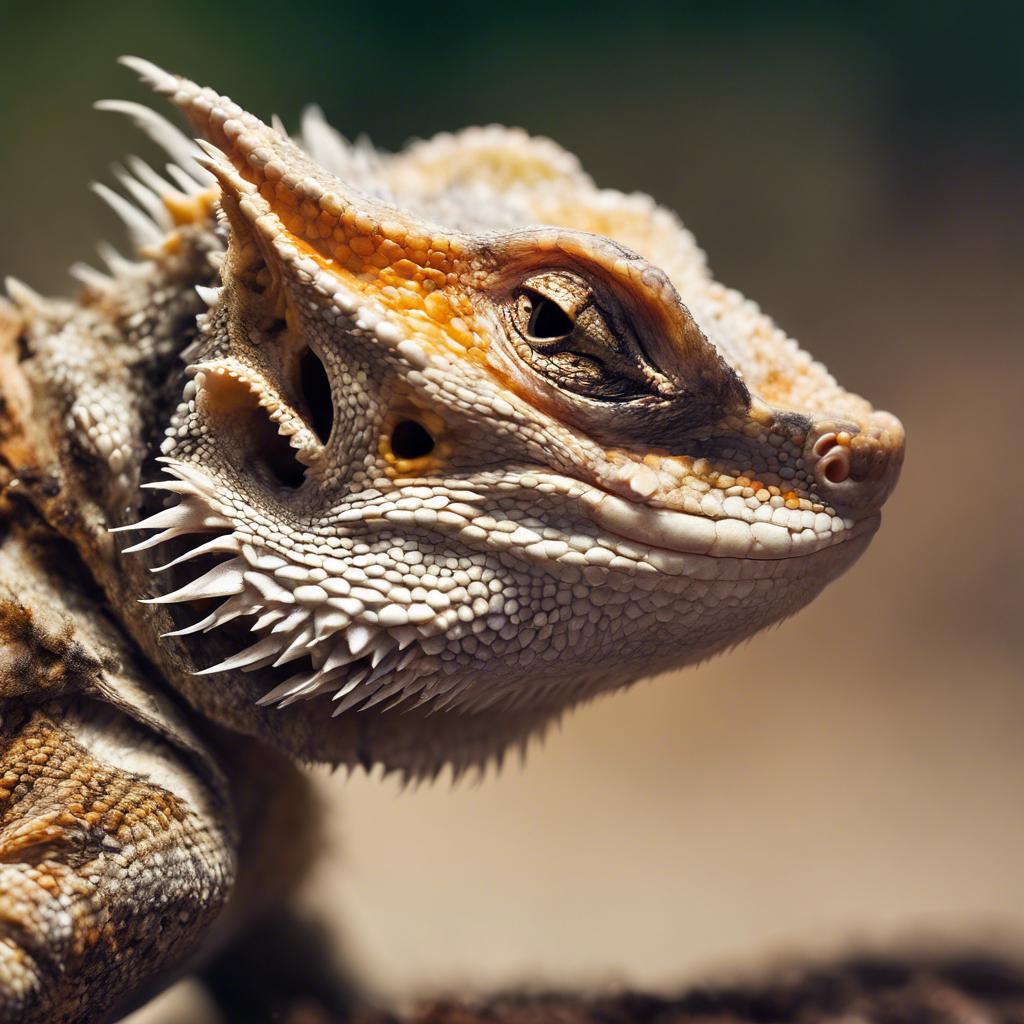Bearded dragons have become increasingly popular as pets in recent years. These fascinating reptiles are known for their unique appearance and docile nature, making them a favorite among reptile enthusiasts. However, many owners are concerned about the potential risks of having bearded dragons in a multi-pet household with cats. One of the main concerns is the potential harm that cat saliva can cause to bearded dragons. In this article, we will explore the risks associated with cat saliva and how to prevent them.
Key Takeaways
- Cat saliva can pose potential risks to bearded dragons.
- Basic requirements and proper nutrition are crucial for bearded dragon care.
- Hydration plays a vital role in maintaining bearded dragon health.
- Stress can negatively impact bearded dragons' immune system.
- Regular veterinary check-ups are essential for preventing health problems in bearded dragons.
The Potential Risks of Cat Saliva for Bearded Dragons
Cat saliva contains bacteria that can be harmful to bearded dragons. When a cat licks itself, it transfers bacteria from its mouth onto its fur. If a bearded dragon comes into contact with this saliva, it can lead to infections. These infections can range from mild skin irritations to more serious internal infections. It is important for owners to be aware of this risk and take steps to prevent their bearded dragons from coming into contact with cat saliva.
In addition to the potential bacterial infections, the presence of cats can also cause stress for bearded dragons. Cats are natural predators and their presence can trigger a stress response in bearded dragons. This stress can weaken their immune system, making them more susceptible to illness. It is important for owners to create a calm and comfortable environment for their bearded dragons and minimize any potential stressors, including the presence of cats.
Understanding Bearded Dragon Care: Basic Requirements and Considerations
To ensure the health and well-being of bearded dragons, it is important for owners to understand their basic care requirements. Bearded dragons require specific temperatures, lighting, and habitat conditions to thrive. They are native to arid regions and need a warm basking spot in their enclosure to regulate their body temperature. Owners should also provide a UVB light source to mimic natural sunlight, as this is essential for their overall health and proper calcium absorption.
In addition to temperature and lighting, owners should also be aware of their bearded dragon's dietary needs. Bearded dragons are omnivores and require a balanced diet of insects, vegetables, and fruits. It is important to provide them with a variety of food options to ensure they receive all the necessary nutrients. Owners should avoid feeding them foods that are high in fat or sugar, as well as foods that are toxic to them, such as avocado or rhubarb.
The Importance of Proper Nutrition for Bearded Dragons
Proper nutrition is crucial for the overall health and well-being of bearded dragons. A balanced diet is essential to ensure they receive all the necessary nutrients. In the wild, bearded dragons primarily eat insects, such as crickets and mealworms, as well as vegetation. In captivity, owners should aim to replicate this diet by providing a variety of insects, such as dubia roaches or phoenix worms, as well as a mix of leafy greens and vegetables.
It is important to note that the size of the food items should be appropriate for the size of the bearded dragon. Younger dragons will require smaller prey items and softer vegetables, while adult dragons can handle larger prey items and tougher vegetables. Owners should also consider dusting their bearded dragon's food with calcium and vitamin supplements to ensure they receive all the necessary nutrients.
The Role of Hydration in Bearded Dragon Health
Hydration is another important aspect of bearded dragon care. Bearded dragons need access to clean water at all times. Owners should provide a shallow dish of water in their enclosure that is large enough for the bearded dragon to soak in if they choose to do so. Soaking can help them stay hydrated and maintain healthy skin.
In addition to providing water, owners should also give their bearded dragons regular baths. Bathing not only helps them stay hydrated, but it also aids in shedding. Bearded dragons shed their skin periodically as they grow, and bathing can help soften the old skin and make it easier for them to shed. Owners should use lukewarm water and gently scrub their bearded dragon's body with a soft brush or cloth during bath time.
The Effects of Stress on Bearded Dragons and Their Immune System

Stress can have a significant impact on the health of bearded dragons. When bearded dragons are stressed, their immune system can become weakened, making them more susceptible to illness. Stress can be caused by a variety of factors, including changes in their environment, improper handling, or the presence of other pets, such as cats.
To minimize stress for bearded dragons, owners should provide a calm and comfortable environment. This includes ensuring that their enclosure is set up properly with the appropriate temperature and lighting conditions. It is also important to handle them gently and avoid any sudden movements or loud noises that may startle them. If there are other pets in the household, such as cats, it is important to supervise interactions and provide separate spaces for each pet to reduce stress.
Common Health Issues in Bearded Dragons: Symptoms, Causes, and Treatments
Bearded dragons can experience a range of health issues that owners should be aware of. One common health issue is respiratory infections. These infections can be caused by bacteria or viruses and can result in symptoms such as wheezing, coughing, or discharge from the nose or mouth. Another common health issue is metabolic bone disease, which is caused by a lack of calcium or vitamin D3 in their diet. This can lead to weak bones, deformities, or difficulty moving.
Bearded dragons can also be affected by parasites, such as mites or worms. These parasites can cause symptoms such as weight loss, diarrhea, or a dull appearance. It is important for owners to be vigilant and monitor their bearded dragon's health closely. If any of these symptoms are observed, it is recommended to seek veterinary care as soon as possible. A reptile veterinarian will be able to diagnose the issue and provide appropriate treatment.
How to Prevent Health Problems in Bearded Dragons
Preventing health problems in bearded dragons starts with providing them with proper nutrition, hydration, and habitat conditions. Owners should ensure that their bearded dragon's enclosure is set up correctly with the appropriate temperature gradient and UVB lighting. They should also provide a balanced diet that includes a variety of insects, vegetables, and fruits.
Regular veterinary check-ups are also important for preventing health problems. Bearded dragons should receive regular check-ups from a reptile veterinarian to ensure their overall health and well-being. During these check-ups, the veterinarian will be able to assess their body condition, check for any signs of illness or injury, and provide any necessary vaccinations or treatments.
The Importance of Regular Veterinary Check-Ups for Bearded Dragons
Regular veterinary check-ups are essential for the long-term health and well-being of bearded dragons. Reptile veterinarians have specialized knowledge and experience in caring for reptiles and can provide valuable guidance and advice to owners. They can also perform diagnostic tests, such as blood work or fecal exams, to detect any underlying health issues that may not be apparent.
Owners should also seek veterinary care if their bearded dragon shows any signs of illness or injury. Some common signs of illness in bearded dragons include loss of appetite, lethargy, changes in behavior, or abnormal stool. It is important not to delay seeking veterinary care if any of these symptoms are observed, as early intervention can greatly improve the chances of a successful outcome.
Keeping Your Bearded Dragon Safe and Healthy in a Multi-Pet Household
By understanding the potential risks of cat saliva and taking steps to prevent them, owners can keep their bearded dragons safe and healthy in a multi-pet household. Providing proper nutrition, hydration, and habitat conditions, as well as regular veterinary care, are key to ensuring the long-term health and well-being of these beloved pets. With proper care and attention, bearded dragons can thrive in a multi-pet household and bring joy to their owners for many years to come.
If you're curious about whether cat saliva is toxic to bearded dragons, you'll definitely want to check out this informative article on Reptile Wizard's blog. They delve into the potential dangers of allowing cats and bearded dragons to interact, discussing the risks associated with cat saliva and the potential harm it can cause to these reptiles. To learn more about this topic, visit Reptile Wizard's blog and gain valuable insights into keeping your bearded dragon safe and healthy.
FAQs
What is the article about?
The article is about whether cat saliva is toxic to bearded dragons.
What are bearded dragons?
Bearded dragons are a type of lizard that are commonly kept as pets. They are native to Australia and are known for their distinctive appearance and docile nature.
What is cat saliva?
Cat saliva is the liquid that cats produce in their mouths. It is used to help them digest their food and keep their mouths clean.
Is cat saliva toxic to bearded dragons?
There is no definitive answer to this question. Some experts believe that cat saliva can be toxic to bearded dragons, while others believe that it is not harmful.
What are the potential risks of exposing bearded dragons to cat saliva?
Exposing bearded dragons to cat saliva can potentially lead to a number of health problems, including infections, digestive issues, and even death.
What should I do if my bearded dragon comes into contact with cat saliva?
If your bearded dragon comes into contact with cat saliva, you should immediately clean the affected area with warm water and soap. You should also monitor your bearded dragon for any signs of illness or discomfort. If you notice any symptoms, you should contact a veterinarian right away.
How can I prevent my bearded dragon from coming into contact with cat saliva?
The best way to prevent your bearded dragon from coming into contact with cat saliva is to keep them separated from cats. You should also make sure to wash your hands thoroughly before handling your bearded dragon, as well as any objects or surfaces that may have come into contact with cat saliva.

